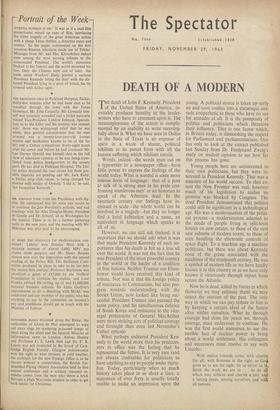DEATH OF A MODERN
THE death of John F. Kennedy, President of the United States of America, in- evitably produces banality in the leader- writers who have to comment upon it. The meaninglessness of the action is comple- mented by an inability to write meaning- fully about it. What we have seen in Dallas in the State of Texas is an expense of spirit in a waste of shame, political nihilism in its purest form with all the human suffering which nihilism entails.
Words, indeed—the words spun out on a typewriter in a newspaper office—have little power to express the feelings of the world today. What is wanted is some more intense form of language: that of a poet to talk of 'a strong man in his pride con- fronting murderous men' or an historian to speak of the Athenian dead. In the twentieth century our feelings have in- creased in scale—the whole world can be involved in a tragedy—but they no longer find a local habitation and a name, an equivalent in language which speaks to all of us.
However, we can still ask (indeed, it is important that we should ask) what it was that made President Kennedy of such im- portance that his death is felt as a loss all over the world. It was not the fact that he was President of the most powerful country in the world or the leader of a coalition of free nations. Neither Truman nor Eisen- hower would have received this kind of tribute. Nor was it that his foreign policy of resistance to Communism, but also pro- gress towards understanding with the Soviet Union, now looked like being suc- cessful. President Truman also pursued the same policy, and his simultaneous defence of South Korea and resistance to the vice- regal pretensions of General MacArthur were more striking acts of political courage and foresight than even last November's Cuban episode.
What perhaps endeared President Ken- nedy to the world more than his predeces- sors in office was the feeling that he represented the future. It is very rare (and not always creditable) for politicians to have anything to say to people under thirty- five. Today, particularly when so much history takes place in so short a time, a statesman of over forty is usually totally unable to make an impression upon the young. A political stance is taken up early on and soon ossifies into a statuesque atti- tude antipathetic to those who have no use for attitudes at all. It is the pomposity of politics and politicians which threatens their influence. That is one factor which, in Britain today, is diminishing the respect for Parliament and parliamentarians. One has only to look at the extract published last Sunday from Dr. Ferdynand Zweig's study on student opinion to see how far this process has gone.
Young people here are uninterested in their own politicians, but they were in- terested in President Kennedy. That was a measure of his world success. To that ex- tent the New Frontier was real, however much of his legislation to realise its promise was blocked by Congress. The dead President demonstrated that politics could still be significant in a technological age. His was a modernisation of the politi- cal process—a modernisation adapted to the needs of people living in split-level houses on new estates, to those of the vast new suburbs of-modern towns, to those of men handling the electronic controls of space flight. To a machine age a machine politician, but there was about Kennedy none of the grime associated with the machines of the nineteenth century. He was a symbol of modern life as we have hardly known it in this country or as we have only known it vicariously through report from across the Atlantic.
Now he is dead, killed by forces in which (however we may estjmate them) we may detect the atavism of the past. The only way in which we can pay tribute to him is by keeping a certain ideal of the future- alive within ourselves. What he through courage had done for peace we, through courage, must endeavour to continue. He was the first world statesman to use the terrible fact of nuclear power to bring about a world settlement. His colleagues and successors must resolve to say with Lincoln : With malice towards none; with charity, for all; with firmness in the right, as Go gives us to see the right, let us strive on t finish the work we are in . . . to do all which may achieve and cherish a just, and a lasting peace, among ourselves, and wits all nations.






























































 Previous page
Previous page